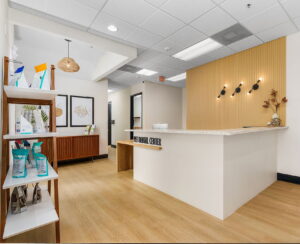
We welcome appointments Monday through Thursday.
Consultations
Upon arrival for a consultation, you will meet with one of our technicians to review the information we’ve gathered from your pet’s medical records in combination with the information you’ve given us over the phone. Dr. Gingerich or Dr. Mack Wilson will then perform an oral and physical exam on your pet. After this is complete, they will be able to speak to you about treatment recommendations and answer any questions you may have regarding your pet’s care. These in person evaluations allow us to develop a Treatment Plan that includes details of the procedure as well as an estimate of costs associated with that procedure. We will go over this with you in detail prior to escorting you to our Client Care Specialists who will assist you in scheduling a future procedure at the time of checkout.
Pre-anesthetic bloodwork is required and should either be done with your veterinarian in advance, or can be performed at Pet Dental Center for convenience. Cardiac evaluation may also be recommended if we feel it is in your pet’s best interest. Each pet is different and has different needs when preparing for a visit! Give us a call if you have questions, we are happy to discuss which recommendations are likely a fit for your pet.
Procedures
Admission times vary but are typically on Monday, Tuesday or Thursday and in the morning. The surgery order Dr. Gingerich, Dr. Mack and Dr. Boruta feel procedures should be performed in will determine what time your pet will be ready to go home. Unfortunately, we are unable to take requests regarding surgery order. The order will be determined based upon individual patient needs for the day. Pick up times are generally sometime between 3:30 and 7:30pm. During the day, your loved one will have been taken on a walk (if applicable!) and given lots of attention! We are proud to have a loving, hands-on staff.
You will receive multiple phone calls throughout the day with updates. We will call to let you know when your pet’s procedure begins, then you will receive a call from Dr. Gingerich or Dr. Mack confirming the findings from the imaging and oral exam so that you two may confirm the treatment you would like them to move forward with. You will also receive a call letting you know your pet is in recovery and what time you should come to pick up. We may give you update calls outside of these three calls depending on when your pet’s procedure is performed. At the time of pick up, we will review pictures and imaging with you as well as making sure you are completely comfortable with home care instructions.
If your pet has a procedure that requires a follow up, this is complimentary and will be scheduled 2-4 weeks after the procedure.

